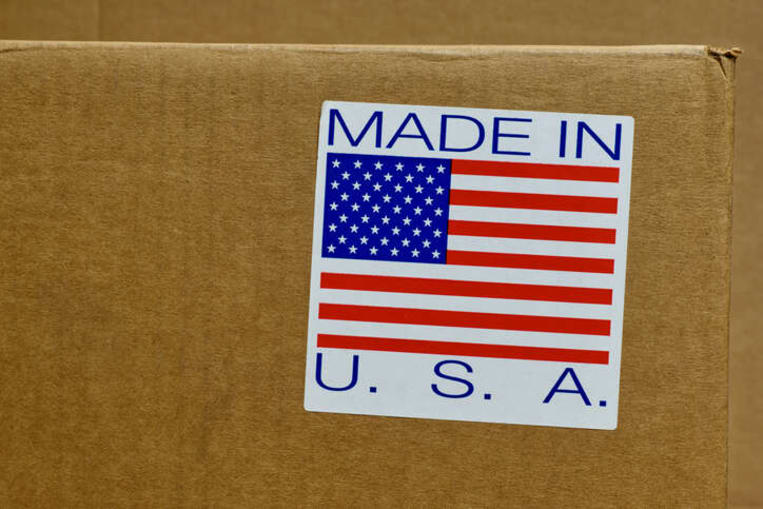
BBB Tip: A shopper’s guide to buying products made in the USA

(Getty Images)
Nearly 80% of United States shoppers would rather buy an American-made product over an imported one if given the choice, according to a Consumer Reports survey. These buyers believe that shopping “Made in America” helps conserve American manufacturing jobs, and many said they would be willing to pay extra for an American-made product.
Identifying American-made products is easier said than done. What do “Made in the USA” and “Made in America” mean? And how can you know what products are made where?
How to identify American-made products
- Get a basic understanding of the FTC’s regulations. The FTC Made in the USA standard is rather complex, but a few key points can help you determine whether a product was made in the United States. U.S. content must be disclosed for wool, fur, textile products, and automobiles. Outside of those products, manufacturers and marketers decide whether to make claims about how American their product is. While FTC regulations apply to all claims made, they do not pre-approve advertising or labeling claims. This means a company could make false claims, and they may not get caught if no one reports them.
- Know your claim types. The FTC designates claims in a few different ways. There are express claims, like when a product directly says, “Made in the USA,” and there are implied claims (i.e., “Our product is of true American quality.”) In either case, these claims must be truthful and substantiated. There are also qualified and unqualified claims. Qualified claims describe the extent, amount, or type of a product’s processing or content and clarify that some of the product or labor is not of domestic origin. Unqualified claims mean that simply saying “Made in the USA,” means “all or virtually all” of the product was made in the U.S.
- Watch out for wording. Read labels carefully and pay attention to the wording. Remember that when a company says a product was “assembled in the USA” it’s likely the product’s main components are imported from another country. Likewise, if a company says its product is “engineered in the USA,” it probably means the concept for the product was produced in the U.S.. Still, the product itself was not put together in a domestic factory. In addition, it’s important to know that “Made in America” technically includes products made anywhere in North, South, or Central America. Only “Made in the USA” specifically applies to the U.S.
- Be on the lookout for impostors. Scammers know that many people are willing to pay extra for an American-made product and they use this to their advantage. Many people have been lured in by false advertising only to find themselves in possession of a counterfeit product or no product at all. One consumer reported purchasing a wreath from a company called US-GARDENING that advertised “The best-selling wreath in the U.S.” for decorating doors. The consumer said, “When I got the wreath, it was made of plastic and fit in the palm of my hand. I purchased from this company because it said it was made in the USA. Buyer beware! I was charged $39.80 by an imposter.”
- Contact the manufacturer directly. Always look up a company’s official website and do some research before purchasing a product. If you can, call them to find out just how much of their product was made in the USA and where assembly or processing took place. If a company doesn’t have a website or contact information or can’t back up their claims, shop elsewhere.
- Look out for misleading logos and brand names. Just because a product features a picture of the American flag, an eagle, or the Statue of Liberty doesn’t mean it was made in the USA. In addition, some foreign-made products come from makers with patriotic-sounding names, such as Americana Olives or United States Sweaters. Don’t rely on brand names and logos alone when determining where a product was made.
- Report false advertising. If you suspect mislabeling or noncompliance with the FTC’s Made in USA standard, report it. You can contact the Division of Enforcement, Bureau of Consumer Protection, Federal Trade Commission, Washington, DC 20580 by mail or (202) 326-2996. You can also send an email to [email protected]. If you have information about import or export fraud, for example, removing country of origin labels and replacing them with Made in USA labels, call Customs’ toll-free Commercial Fraud Hotline, 1-800-ITS-FAKE. You can also report noncompliance to your state Attorney General and BBB Scam Tracker.
For more information
Determining if a product was made in the USA can be even harder when shopping online. Consult the BBB Tip: Smart Shopping Online and our Online Shopping Guide for more tips and advice. You may also want to read the BBB Scam Alert about misleading social media ads, since this is a common way scammers spread false advertising.
If you purchased an item that didn’t live up to the advertising claims made about it, don’t hesitate to report your experience to BBB Scam Tracker. Your report can help others avoid scam tactics they may not be aware of.
Still Need Assistance?
Contact Your Local BBB
Your local Better Business Bureau can assist you with finding businesses you can trust. Start With Trust®.
Additional Resources
Let BBB help you resolve problems with a business
Research and report on scams and fraud using BBB Scam Tracker
Learn more about the value of BBB Accreditation